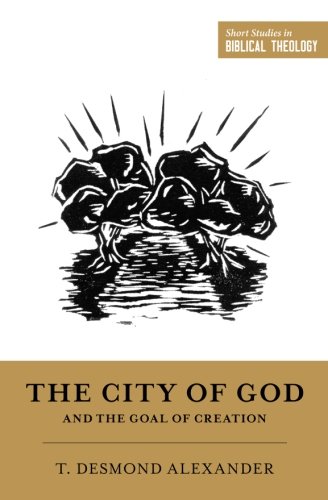A Brief Book Summary from Books At a Glance
by Steve West
Table of Contents
Introduction
1 The Godless City
2 The Temple-City
3 The Holy Mountain City
4 The Royal City
5 Envisaging a Transformed Jerusalem
6 Hope for Jerusalem Beyond Divine Judgment
7 Seeking the City That Is to Come
8 Anticipating New Jerusalem
Summary
Chapter 1: The Godless City
The Eden narrative in Genesis establishes the foundation for the idea that God’s plan is to live in an incredible city with his people. Given the fall into sin, however, the impulse to build cities is perverted by Cain into a project that is not aimed at giving glory to God, but rather creating idolatrous spaces for personal security and fame. Babel is the antithesis of what God commanded: it tried to bring everyone together rather than fulfilling the creation mandate to fill the earth. Its builders wanted to make a name for themselves, and in their pride, they wanted to build a tower that reaches to the heavens. They wanted to be supreme in both heaven and earth. Linguistically, the word “Babel” occurs over 200 times in the Hebrew Bible, and it is almost always translated as “Babylon.” Babel is Babylon, and it is the antithesis of God’s city and is also the great rival to the purposes and designs of God for his people. Nimrod is seen as an aggressive, violent ruler who opposes God’s ways, and his leadership is linked to Babylon. In Babel, people use their gifts to create a society that rejects God. In judgment, God disperses the people of Babel, but Babylon is present whenever creatures try to live without their Creator. Babel/Babylon, therefore, is an ever-present reality in this world.
Chapter 2: The Temple-City
God scattered the builders of Babel, but their mindset recurs all throughout human history. Genesis reveals that after this scattering, God chose Abram to establish a different type of human community. Abram is called out of the area of Babylon, and it is through his line that God would eventually found his city (Jerusalem). It was also through Abram’s offspring that God created the way through which he would dwell on earth with his people. At Babel, people wanted to make a great nation and a name for themselves; with Abram, God promised that as a covenant gift of grace, he would make Abram’s name great and ensure that many nations come from his body. Hebrews 11 emphasizes that Abram lived his life by faith, looking forward to the city that God would build. The eschatological hope was to live in God’s city with him forever.
When the patriarchs were building altars on their travels, they were witnessing to places where God dwells and meets with people. God blessed the line of Abraham with exponential growth, but his numerous descendants were enslaved in Egypt by a Pharaoh who abused them in the building of his own city and storehouses. When God brought Israel out of Egypt, his people praised him because he would bring them to a place where they could live with him. Jerusalem became the holy city of God, and his temple was built there as his house and palace. Given that Jerusalem was the location of God’s house, those who loved him would travel there on pilgrimage. Psalms contains numerous songs that celebrate going to the house of the Lord, meeting him there, and worshiping him in his courts. The psalmists long to be in God’s temple, praising his name forever. Their expressions of longing are expressions of their eschatological vision. . . .
[To continue reading this summary, please see below....]The remainder of this article is premium content. Become a member to continue reading.
Already have an account? Sign In
